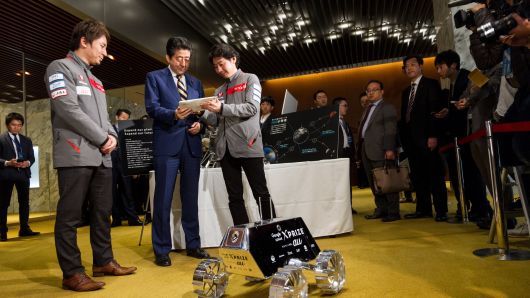Japanese government launches $940 million fund for space start-ups
- The Japanese government is offering $940 million to fund space start-ups in a new push to grow the industry, the government announced Tuesday at an event in Tokyo.
- The funds will be made available through investments and loans over the next five years.
- Japanese start-ups such as ispace see the new funding as key to the long-term growth of the nation’s space industry.
TOKYO (March 20):Japan is offering $940 million to fund space start-ups in a new push to grow the industry, the government announced Tuesday at an event in Tokyo.

Figure 1: CEO of ispace Takeshi Hakamada speaks to Japan’s Prime Minister Shinzo Abe at government-hosted event in Tokyo.
The funds will be made available through investments and loans over the next five years, as part of a government-led initiative to double Japan’s more than $11 billion space industry. With less than 20 Japanese space start-ups currently operating, many see this as critical to helping new companies cover costs such as research or applying for patents.
“We believe this will be remembered as a turning point for our burgeoning industry,” Takeshi Hakamada, CEO and founder of lunar exploration start-up ispace, said in a statement.
Ispace has received government backing in the past, including during a recent $90.2 million round of funding that included Suzuki Motor and Japan Airlines. Founded seven years ago, ispace is stepping beyond the Google-backed Lunar XPRIZE competition to fund two exploration missions to the moon, with the first by the end of 2019 and the second by the end of 2020.
The Japanese government is setting up an agency to manage the funds and connect start-ups with local talent from organizations such as the Japan Aerospace Exploration Agency or the rocket-building arm of Mitsubishi Heavy Industries. Initially, start-ups will be eligible to each receive about $100,000 in aid to help present concepts to investors. Promising ventures and more mature companies will be able to tap into the rest of the $940 million fund to further development.
Japan also announced it is considering new laws and policies that would allow businesses to own plots of land developed on the moon, in a similar manner to the laws passed by the United States and Luxembourg. So far, the U.S. and Luxembourg are the only two countries in the world to have passed laws giving corporations ownership of materials mined in space, but only after they’ve been extracted. That legal framework has seen the tiny European country attract dozens of space companies, with another 70 space companies looking to establish in Luxembourg, according to Deputy Prime Minister Etienne Schneider.
While ispace is based in Japan, the company also has subsidiary offices in Luxembourg and California. Having a legal framework of ownership will be critical to the start-up’s success once exploratory missions begin collecting materials and information.
“We’re going to bring scientific instruments to the moon, and then sell the right to use our data to space agencies and other institutions, as well as provide transportation services, for profit,” Hakamada said.
Japan’s announcement comes after a record year for U.S. commercial space companies, which received more than $3.9 billion in private investment last year. Venture capital is both pouring into the U.S. sector and finding success: Over 120 firms made investments in space last year, topping a peak of 89 in 2015. The last eight years have seen around $25 billion in exits, as acquisitions and public offerings take venture capital investments from start-ups to the next level.
[Source: “Japanese government launches $940 million fund for space start-ups” published by CNBC LLC]Photo Credits: CNBC LLC





